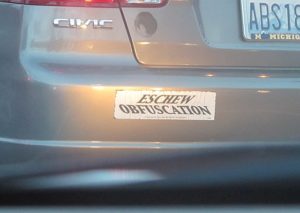In Defense of Obfuscation
Written by Mette Leonard Høeg
At the What’s the Point of Moral Philosophy congress held at the University of Oxford this summer, there was near-consensus among the gathered philosophers that clarity in moral philosophy and practical ethics is per definition good and obscurity necessarily bad. Michael J. Zimmerman explicitly praised clarity and accessibility in philosophical writings and criticised the lack of those qualities in especially continental philosophy, using some of Sartre’s more recalcitrant writing as a cautionary example (although also conceding that a similar lack of coherence can occasionally be found in analytical philosophy too). This seemed to be broadly and whole-heartedly supported by the rest of the participants.

